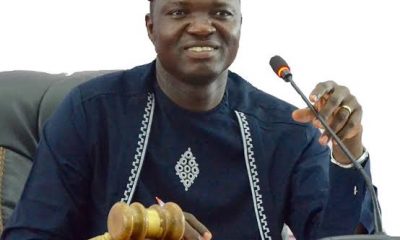Education
NELFUND Pledges Tech-Driven Student Loan Access

Mr Akintunde Sawyerr, Managing Director of the Nigerian Education Loan Fund (NELFUND), has reaffirmed the Fund’s commitment to developing a technology-driven system aimed at enhancing easy and equitable access to student loans.
Sawyerr gave the assurance on Tuesday in Abuja while addressing representatives from Polytechnics, Monotechnics, and Institutes during a Stakeholders Engagement Session and Technical Workshop on NELFUND System Automation and Loan Application Processes.
He explained that the Fund was working towards a seamless, transparent platform that allowed students to confidently access loans without unnecessary stress.
“At NELFUND, our mission goes beyond disbursing loans.
It’s about opening doors and ensuring every young Nigerian with a desire to learn and grow has a real opportunity, regardless of their background, location, or field of study.“For too long, students, especially in technical institutions, have faced significant financial barriers. Many have had to drop out, while others never even considered applying.
“That’s the gap we at NELFUND aim to close but we can’t do it alone. This is a shared mission involving government institutions and the private sector,” Sawyerr said.
Sawyerr emphasised that NELFUND was not only providing financial support but also building a technology-driven infrastructure that enabled easier application processes, institutional verification, and fast, fair disbursement.
“We’re striving for stress-free access a system students can trust.
“Transparency is key so that no applicant is left in the dark. We rely on you, our institutional partners, to help bring this vision to life,” he added.
He urged institutions to partner with NELFUND, saying the goal was to build a system that would not only be functional and sustainable but also truly transformative.
“As we integrate NELFUND processes with institutional systems and standards, we must remember that at the centre of all this is the student, a young Nigerian with dreams and ambition. Everything we do must serve that student.
“The only way forward is through collaboration, open communication, and practical solutions,” he said.
Also speaking at the event, Iyal Mustapha, Executive Director of Operations at NELFUND, said that more than 320,000 students had received funding so far, with further verifications ongoing.
Mustapha clarified that discrepancies between registered students and those whose applications were successfully processed often stemmed from incomplete applications on the students’ part.
“We have 576,000 registrations on our portal, but only 516,000 completed applications. Some may have dropped out due to data issues or just wanted to test the system.
“We want to bridge this gap, and with your support, we can ensure more students access the institutional loan,” he said.
Mustapha further explained that the institutional loan, which is different from the monthly upkeep loan of N20,000, was disbursed directly to institutions.
He added that NELFUND was considering integrating directly with institutional portals to simplify the process for students.
“We’re exploring the possibility of deploying our IT teams to institutions to enable direct connection with your portals.
“Ideally, students should be able to apply via your platforms without having to come through NELFUND, making the process smoother and more accessible,” he said
Education
FG unveils interest-free loan for tertiary institution workers

By Tony Obiechina Abuja
The Federal Government has unveiled the Tertiary Institutions Staff Support Fund (TISSF), an interest-free loan scheme designed to improve the welfare, professional growth, and financial stability of Nigeria’s tertiary institution workforce.
The Minister of Education, Dr.
Tunji Alausa, who unveiled the initiative in Abuja on Thursday, described it as a strategic empowerment platform that would give both academic and non-academic staff the financial support they needed to serve students with renewed dedication and live with dignity.The minister further explained that TISSF is an integral part of President Bola Tinubu’s Renewed Hope Reform Agenda for the education sector, which prioritises people as the nation’s greatest asset in transforming the education sector and driving economic growth.
According to him, the programme is a joint initiative of the Federal Ministry of Education and the Tertiary Education Trust Fund (TETFund), implemented in partnership with the Bank of Industry (BoI).
Under the scheme, beneficiaries can access interest-free loans for medical expenses, family and accommodation needs, transportation (including electric vehicles and CNG conversions), small-scale enterprises and agriculture, as well as academic advancement through certifications and capacity-building programmes.
The Minister said; “TISSF is more than a financial product; it is a workforce transformation tool. By easing financial burdens, we expect to improve staff retention, boost morale, and enhance institutional performance for better student outcomes.”
Eligibility, he said, covers confirmed full-time staff of all federal universities, polytechnics, and colleges of education, along with one state-owned institution in each category per state, while applicants must have at least five years to retirement and be members of recognised staff unions such as ASUU, NASU, COEASU, and SSANIP. This translates to 248 eligible institutions nationwide.
“Each eligible staff member can access up to N10 million, subject to a cap of 33.3% of their gross annual salary. The loans are interest-free, repayable over five (5) years, with 12 months moratorium before repayment begins,” the Minister added.
Education
FG reaffirms zero tolerance for exam malpractice

By Tony Obiechina Abuja
The Minister of Education, Dr. Olatunji Alausa has reaffirmed the Federal Government’s commitment to transparency, accountability, educational excellence, and zero tolerance for examination malpractice.
In a statement by Mrs Folashade Boriowo Director of Press and public relations, Alausa spoke against the backdrop of the 2025 WAEC results released recently.
According to official statistics from WAEC, the percentage of candidates who obtained five credits with or without English Language and Mathematics rose to 91.
14% in 2025, compared to 73.79% in 2024 and 84.38% in 2023.However, candidates securing five credits including English Language and Mathematics stood at 62.
96% in 2025, down from 72.12% in 2024 and 79.81% in 2023.Reiterating the Federal Government’s zero-tolerance policy towards examination malpractice, Dr. Alausa highlighted the consistent decline in malpractice rates over the past three years—from 16.29% in 2023 to 11.92% in 2024, and 9.70% in 2025.
He attributed this progress to robust anti-malpractice measures introduced by WAEC, including the serialization of question papers in key subjects such as English Language, Mathematics, Biology, and Economics.
The Minister emphasized the government’s resolve to build human capacity through continuous teacher training and support.
“We are committed to producing smart, competent teachers to better prepare our students for academic success. This is crucial to ensuring that our examinations remain credible and flawless,” he said.
According to him, going forward, the Ministry will roll out Computer-Based Testing (CBT) for WAEC and NECO objective papers in 2025, and for both essay and objective papers in 2026. This step is aimed at enhancing efficiency, curbing malpractice, and aligning Nigeria’s examination system with global best practices.
Dr. Alausa called on all stakeholders, including parents, guardians, teachers, and community leaders, to support students, encourage discipline, and create enabling environments for learning.
“Let us work together to ensure that every hardworking child has the opportunity to succeed,” he urged.
Education
Varsity Don Advocates Establishment of National Bureau for Ethnic Relations, Inter-Group Unity

By David Torough, Abuja
A university scholar, Prof. Uji Wilfred of the Department of History and International Studies, Federal University of Lafia, has called on the Federal Government to establish a National Bureau for Ethnic Relations to strengthen inter-group unity and address the deep-seated ethnic tensions in Nigeria, particularly in the North Central region.
Prof.
Wilfred, in a paper drawing from years of research, argued that the six states of the North Central—Kwara, Niger, Kogi, Benue, Plateau, and Nasarawa share long-standing historical, cultural, and economic ties that have been eroded by arbitrary state boundaries and ethnic politics.According to him, pre-colonial North Central Nigeria was home to a rich mix of ethnic groups—including Nupe, Gwari, Gbagi, Eggon, Igala, Idoma, Jukun, Alago, Tiv, Birom, Tarok, Angas, among others, who coexisted through indigenous peace mechanisms.
These communities, he noted, were amalgamated by British colonial authorities under the Northern Region, first headquartered in Lokoja before being moved to Kaduna.
He stressed that state creation, which was intended to promote minority inclusion, has in some cases fueled exclusionary politics and ethnic tensions. “It is historically misleading,” Wilfred stated, “to regard certain ethnic nationalities as mere tenant settlers in states where they have deep indigenous roots.”
The don warned that such narratives have been exploited by political elites for land grabbing, ethnic cleansing, and violent conflicts, undermining security in the sub-region.
He likened Nigeria’s ethnic question to America’s historic “race question” and urged the adoption of structures similar to the Freedmen’s Bureau, which addressed racial inequality in post-emancipation America through affirmative action and equitable representation.
Wilfred acknowledged the recent creation of the North Central Development Commission by President Bola Tinubu as a step in the right direction, but said its mandate may not be sufficient to address ethnic relations.
He urged the federal government to either expand the commission’s role or create a dedicated Bureau for Ethnic Relations in all six geo-political zones to foster reconciliation, equality, and sustainable development.
Quoting African-American scholar W.E.B. Du Bois, Prof. Wilfred concluded that the challenge of Nigeria in the 21st century is fundamentally one of ethnic relations, which must be addressed with deliberate policies for unity and integration.



















